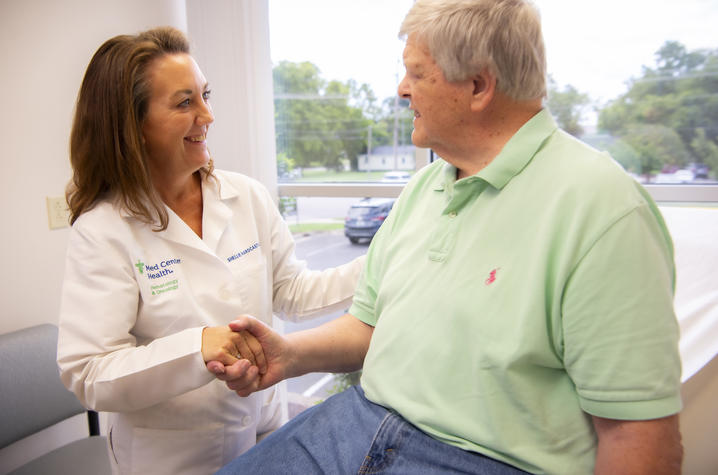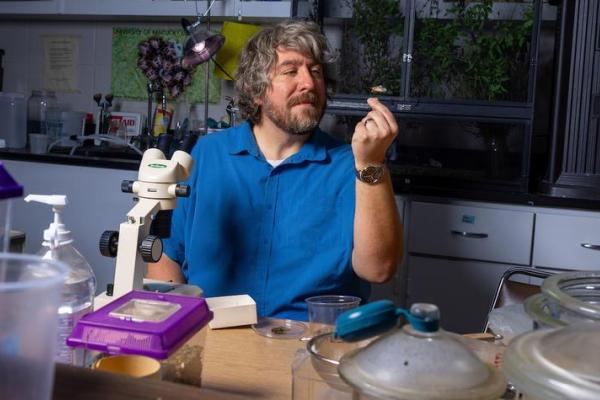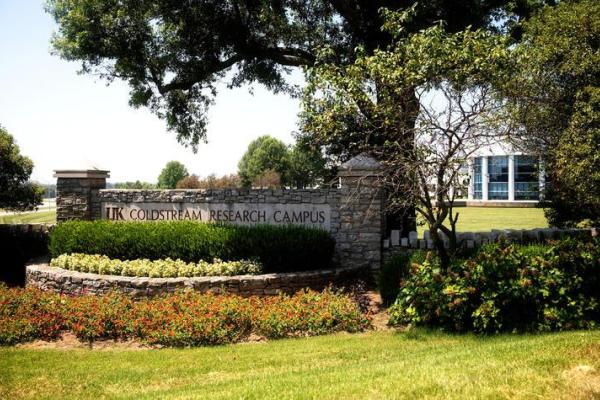Precision medicine, Markey collaboration delivers hope to Bowling Green patient

When Richard Simpson complained of an unusual and sudden pain in his shoulder, he got an X-ray, but it didn’t indicate what was wrong. When the pain persisted, doctors ordered a CT scan. Soon after, the 76-year-old Bowling Green resident got a concerning call from his doctor: the scan showed a tumor in the upper lobe of his right lung.
He was immediately referred to an oncologist at The Medical Center at Bowling Green. That’s where he was diagnosed with stage 4 non-small cell lung cancer in December 2022.
It was the end of what had been a difficult year for Simpson, who had just lost his wife of 45 years. Simpson, who is blind and had relied heavily upon his late wife, was still trying to adapt to his new life.
“Even today, I’m still trying to make sense of it all,” Simpson said. “The diagnosis was such a shock since I didn’t have a history of smoking. It was just a lot to take in at once.”
Trust in his treatment
At Simpson’s first appointment with Med Center Health oncologist Catherine Heltsley, M.D., he learned he might be a candidate for a new kind of treatment that targets the DNA mutations in his tumor. He’d need to have a biopsy and biomarker testing to find out.
Heltsley ordered a genomic analysis, which was sent to the University of Kentucky Markey Cancer Center’s Molecular Tumor Board for review. There, a team of experts met to discuss the genetic profile of his case and recommend a treatment.
The Medical Center at Bowling Green is part of the UK Markey Cancer Center Research and Affiliate Networks. The collaboration with community hospitals across Kentucky gives cancer patients access to the latest treatments and clinical trials closer to home.
“I knew right away I was in good hands with Dr. Heltsley,” Simpson said. “And with the hospital’s partnership with Markey, I was confident I was getting the best care currently available anywhere.”
Testing results showed the tumor had a mutation affecting the mesenchymal-epithelial transition, or MET, gene. MET mutations are found in only about 3% of patients with non-small cell lung cancer and are more common in older patients and nonsmokers.
“It was exciting news,” Heltsley said. “MET mutations are associated with cancer growth, but there are medications available that can target them and stop the cancer from spreading.”
“It sounds crazy to say when you’re faced with a stage 4 cancer diagnosis, but I felt really lucky,” said Simpson. “It was a blessing to just have some hope there was a treatment out there that might work.”
Simpson started a targeted therapy called capmatanib (Tabrecta) in February 2023. Within weeks, the pain in his shoulder — caused by the tumor compressing nerves and blood vessels — was gone. By April, the tumor was gone, too. A scan showed no signs of cancer.
“He’s had an excellent response,” Heltsley said. “Results like this are rare for someone who isn’t receiving targeted therapy. If we were just using standard chemotherapy, they would be unheard of.”
“I’ve watched some friends go through chemo and deal with horrible side effects, and I’m happy to avoid that, especially at 76-years old,” Simpson said. “Right now this treatment is giving me a good quality of life, which is more than I could have hoped for.”
A strong support network
Simpson’s blindness is caused by retinitis pigmentosa, a genetic disease that causes cells in the retina to break down slowly over time.
“I didn’t fully lose my vision until my 50s, so I’m used to that and get along just fine. But losing my partner of 45 years has been something I’m still adapting to,” he said. “Add in cancer diagnosis and treatment, and it’s been quite the rollercoaster.”
Simpson credits a strong support network of family and friends for helping him through the ups and downs of diagnosis and treatment. His son lives nearby and visits him several days a week and helps with transportation to doctor appointments. He also has a caregiver who comes by to help with errands and household tasks.
Simpson says he also makes sure to stay busy. He’s active in his church and has a network of friends who he still meets for lunch every week. He also spends a lot of time with his grandchildren — he just welcomed his third this summer.
More hope for patients than ever before
For many patients like Simpson, biomarker testing opens the door to targeted treatments that can be more effective and have fewer side effects compared to traditional treatments like surgery, chemotherapy and radiotherapy.
Targeted treatments are the foundation of precision medicine, an approach to cancer care tailored to the specific genetic characteristics of an individual’s cancer.
Precision medicine is rapidly advancing, which can make it complicated for doctors to select the best treatment based on the results of biomarker testing. Molecular tumor boards offer a solution: the multidisciplinary team of clinicians and researchers are up-to-speed on the hundreds of different actionable genetic mutations, changing guidelines for their treatment, and the latest clinical trials.
Markey’s Molecular Tumor Board will review patients’ genomic profiles at no cost to physicians at UK HealthCare and at regional hospitals throughout Kentucky — like the Medical Center at Bowling Green.
“Advances in precision medicine offer more hope for patients than ever before, and increased access to molecular tumor board review means more patients across Kentucky can get access to the latest cancer treatments,” said Jill Kolesar, Pharm.D., a professor in UK’s College of Pharmacy and co-director of Markey’s Molecular Tumor Board.
Through Markey’s Research Network, Simpson also enrolled in a new clinical trial led by Kolesar, which will examine the impact molecular tumor board review has in cancer patient outcomes for people with late stage lung cancer in rural Kentucky.
With Kentucky leading the nation in lung cancer incidence and mortality, the results will provide an understanding of the direct impact that tumor board review can have.
World-class treatment, close to home
Markey is one of just 56 cancer centers in the U.S. designated by the National Cancer Institute as a Comprehensive Cancer Center. The designation recognizes excellence in cancer care and research. It also means that Markey patients can take advantage of new treatments and clinical trials not available elsewhere.
For patients like Simpson, it means confidence that they are getting the best available cancer care without having to leave the state.
“I never even had to leave Bowling Green for an appointment, and I’m extremely thankful for that,” Simpson said. “At The Medical Center at Bowling Green, I knew I was getting the same care here that I’d get in Nashville, or Lexington or any of the nation’s top cancer centers.”
More from this series Research Priorities - Cancer
Credits
Words: Elizabeth Chapin (Public Relations & Strategic Communication)
Photo: Joe Imel



